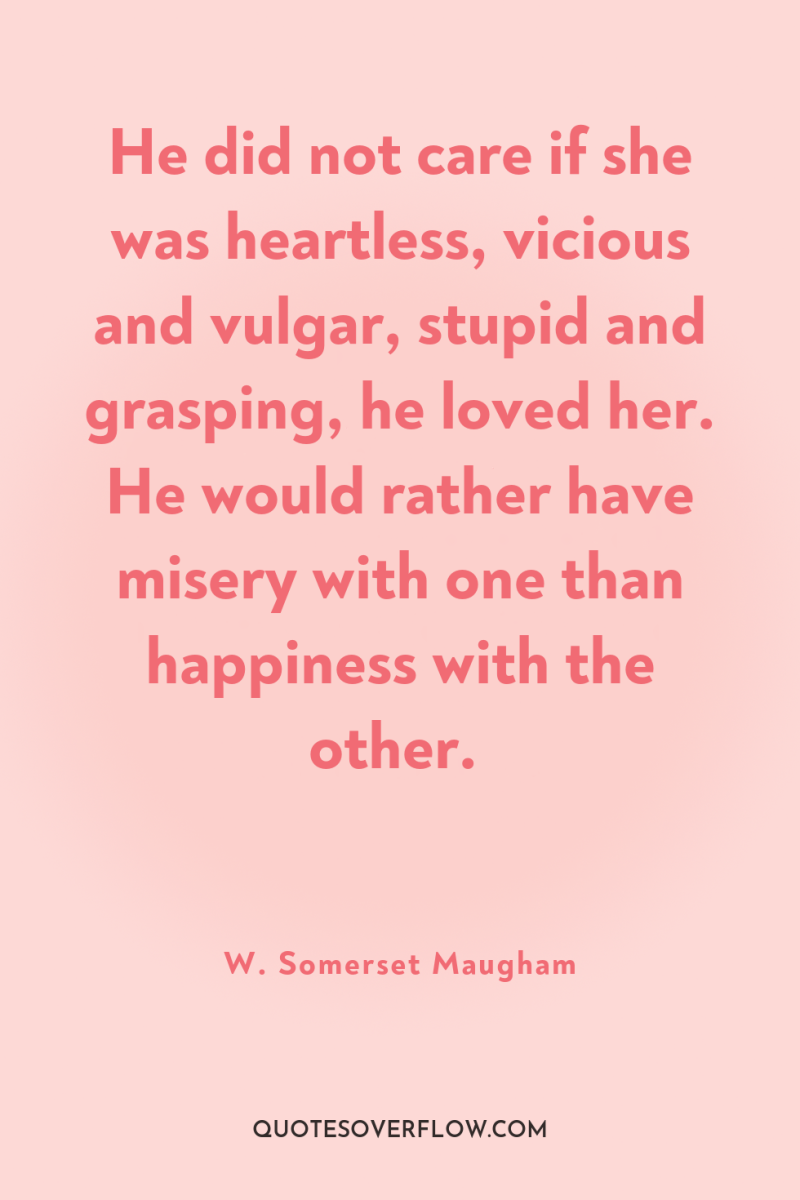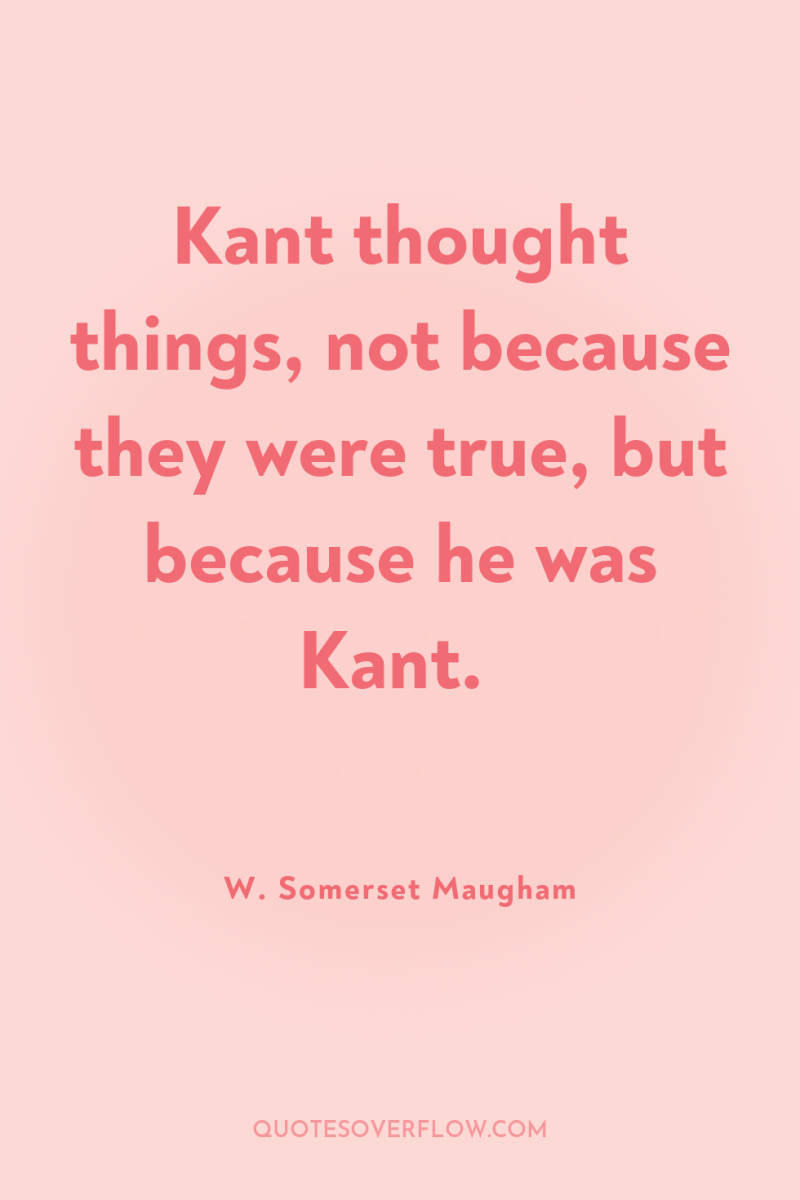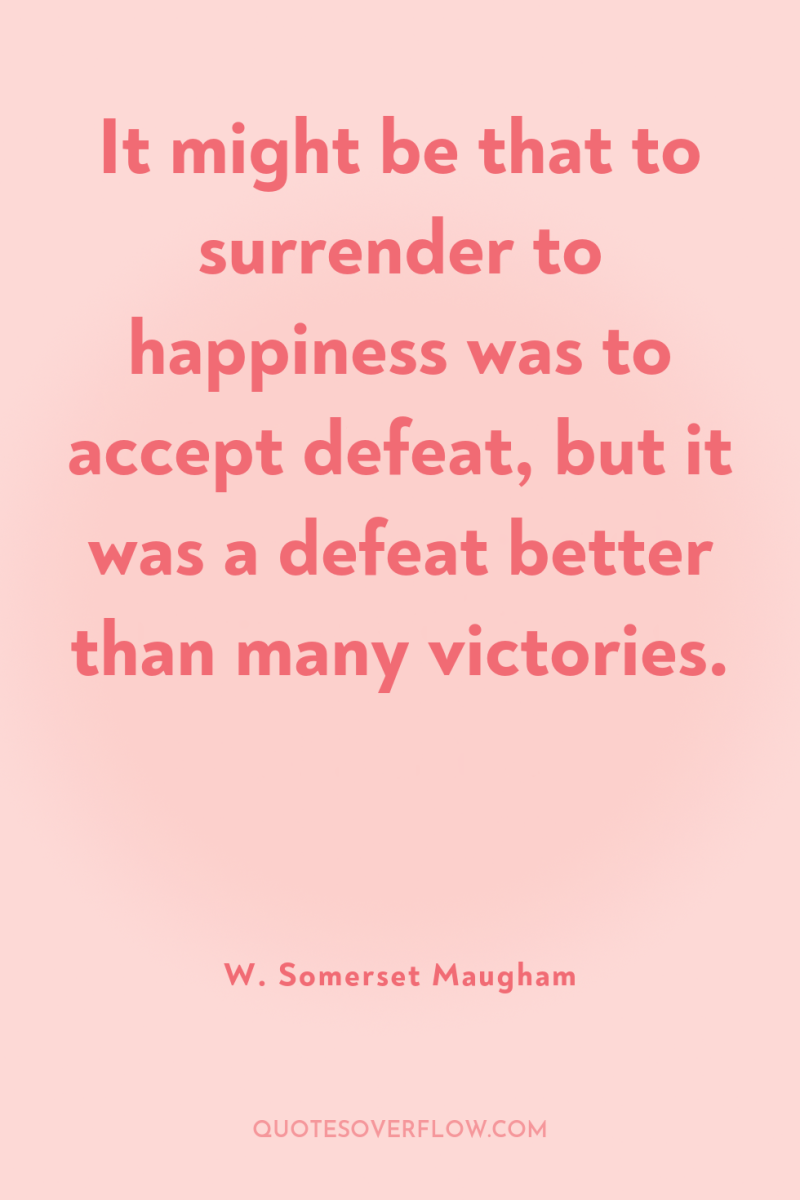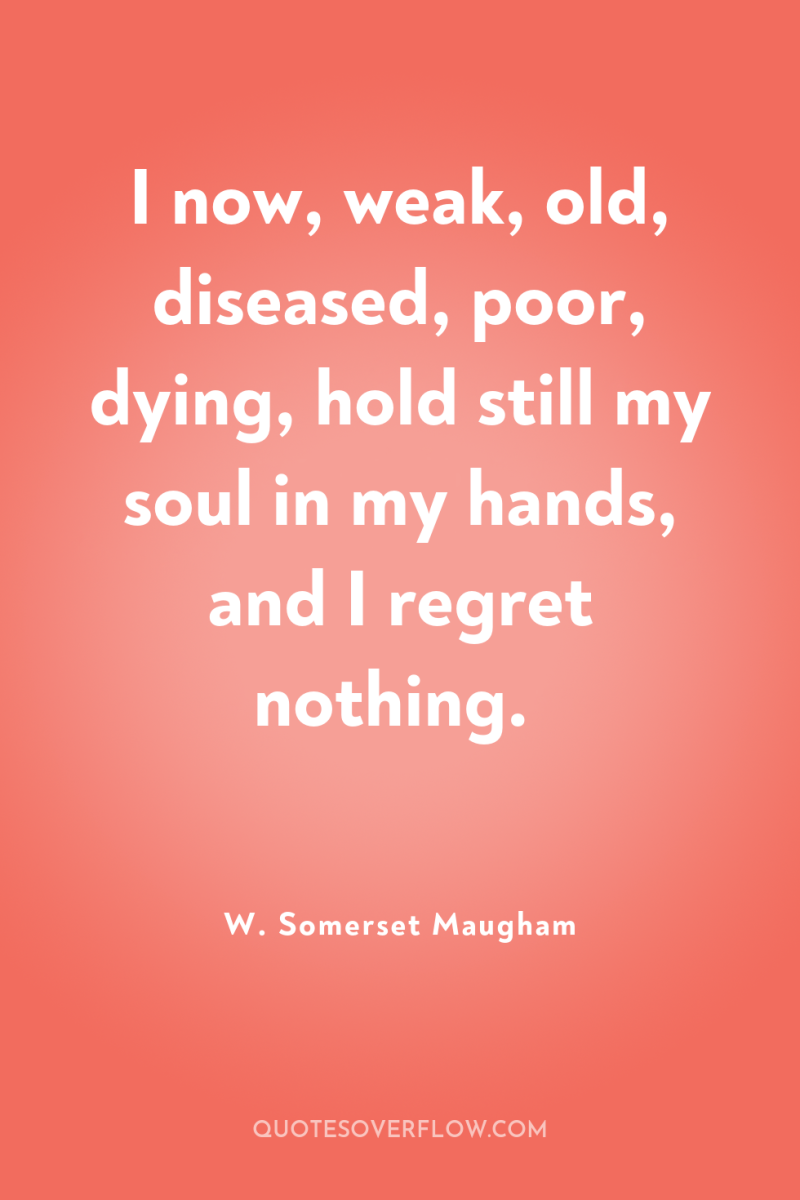
1
He did not care if she was heartless, vicious and vulgar, stupid and grasping, he loved her. He would rather have misery with one than happiness with the other.W. Somerset Maugham

2
Oh, it's always the same, ' she sighed, 'if you want men to behave well to you, you must be beastly to them; if you treat them decently they make you suffer for it.W. Somerset Maugham
3
It is an illusion that youth is happy, an illusion of those who have lost it; but the young know they are wretched for they are full of the truthless ideal which have been instilled into them, and each time they come in contact with the real, they are bruised and wounded. It looks as if they were victims of a conspiracy; for the books they read, ideal by the necessity of selection, and the conversation of their elders, who look back upon the past through a rosy haze of forgetfulness, prepare them for an unreal life. They must discover for themselves that all they have read and all they have been told are lies, lies, lies; and each discovery is another nail driven into the body on the cross of life.W. Somerset Maugham
4
He was always seeking for a meaning in life, and here it seemed to him that a meaning was offered; but it was obscure and vague . He saw what looked like the truth as by flashes of lightening on a dark, stormy night you might see a mountain range. He seemed to see that a man need not leave his life to chance, but that his will was powerful; he seemed to see that self-control might be as passionate and as active as the surrender to passion; he seemed to see that the inward life might be as manifold, as varied, as rich with experience, as the life of one who conquered realms and explored unknown lands. .W. Somerset Maugham

5
Kant thought things, not because they were true, but because he was Kant.W. Somerset Maugham
6
He could breathe more freely in a lighter air. He was responsible only to himself for the things he did. Freedom! He was his own master at last. From old habit, unconsciously he thanked God that he no longer believed in Him.W. Somerset Maugham

7
Why did you look at the sunset?' Philip answered with his mouth full: Because I was happy.W. Somerset Maugham

8
It might be that to surrender to happiness was to accept defeat, but it was a defeat better than many victories.W. Somerset Maugham
9
Philip thought that in throwing over the desire for happiness he was casting aside the last of his illusions. His life had seemed horrible when it was measured by its happiness, but now he seemed to gather strength as he realised that it might be measured by something else. Happiness mattered as little as pain. They came in, both of them, as all the other details of his life came in, to the elaboration of the design. He seemed for an instant to stand above the accidents of his existence, and he felt that they could not affect him again as they had done before. Whatever happened to him now would be one more motive to add to the complexity of the pattern, and when the end approached he would rejoice in its completion. It would be a work of art, and it would be none the less beautiful because he alone knew of its existence, and with his death it would at once cease to be. .W. Somerset Maugham
10
What d'you suppose I care if I'm a gentleman or not? If I were a gentleman I shouldn't waste my time with a vulgar slut like you.W. Somerset Maugham
11
I know that I shall die struggling for breath, and I know that I shall be horribly afraid. I know that I shall not be able to keep myself from regretting bitterly the life that has brought me to such a pass; but I disown that regret. I now, weak, old, diseased, poor, dying, hold still my soul in my hands, and I regret nothing.W. Somerset Maugham
12
It is clear that men accept an immediate pain rather than an immediate pleasure, but only because they expect a greater pleasure in the future. Often the pleasure is illusory, but their error in calculation is no refutation of the rule. You are puzzled because you cannot get over the idea that pleasures are only of the sense; but, child, a man who dies for his country dies because he likes it as surely as a man eats pickled cabbage because he likes it.W. Somerset Maugham
13
You've been brought up like a gentleman and a Christian, and I should be false to the trust laid upon me by your dead father and mother if I allowed you to expose yourself to such temptation.' Well, I know I'm not a Christian and I'm beginning to doubt whether I'm a gentleman, ' said Philip.W. Somerset Maugham

14
Schools are made for the average. The holes are all round, and whatever shape the pegs are they must wedge in somehow. One hasn't time to bother about anything but the average.W. Somerset Maugham
15
Insensibly he formed the most delightful habit in the world, the habit of reading: he did not know that thus he was providing himself with a refuge from all the distress of life; he did not know either that he was creating for himself an unreal world which would make the real world of every day a source of bitter disappointment.W. Somerset Maugham
16
His habit of reading isolated him: it became such a need that after being in company for some time he grew tired and restless; he was vain of the wider knowledge he had acquired from the perusal of so many books, his mind was alert, and he had not the skill to hide his contempt for his companions' stupidity. They complained that he was conceited; and, since he excelled only in matters which to them were unimportant, they asked satirically what he had to be conceited about. He was developing a sense of humour, and found that he had a knack of saying bitter things, which caught people on the raw; he said them because they amused him, hardly realising how much they hurt, and was much offended when he found that his victims regarded him with active dislike. The humiliations he suffered when he first went to school had caused in him a shrinking from his fellows which he could never entirely overcome; he remained shy and silent. But though he did everything to alienate the sympathy of other boys he longed with all his heart for the popularity which to some was so easily accorded. These from his distance he admired extravagantly; and though he was inclined to be more sarcastic with them than with others, though he made little jokes at their expense, he would have given anything to change places with them.W. Somerset Maugham
17
He began to read at haphazard. He entered upon each system with a little thrill of excitement, expecting to find in each some guide by which he could rule his conduct; he felt himself like a traveller in unknown countries and as he pushed forward the enterprise fascinated him; he read emotionally, as other men read pure literature, and his heart leaped as he discovered in noble words what himself had obscurely felt.W. Somerset Maugham
18
I don't think that women ought to sit down at table with men. It ruins conversation and I'm sure it's very bad for them. It puts ideas in their heads, and women are never at ease with themselves when they have ideas.W. Somerset Maugham
19
But Philip was impatient with himself; he called to mind his idea of the pattern of life: the unhappiness he had suffered was no more than part of a decoration which was elaborate and beautiful; he told himself strenuously that he must accept with gaiety everything, dreariness and excitement, pleasure and pain, because it added to the richness of the design.W. Somerset Maugham

20
I now, weak, old, diseased, poor, dying, hold still my soul in my hands, and I regret nothing.W. Somerset Maugham
21
I don't see the use of reading the same thing over and over again, ' said Phillip. 'That's only a laborious form of idleness.' But are you under the impression that you have so great a mind that you can understand the most profound writer at a first reading?' I don't want to understand him, I'm not a critic. I'm not interested in him for his sake but for mine.' Why do you read then?' Partly for pleasure, because it's a habit and I'm just as uncomfortable if I don't read as if I don't smoke, and partly to know myself. When I read a book I seem to read it with my eyes only, but now and then I come across a passage, perhaps only a phrase, which has a meaning for me, and it becomes part of me; I've got out of the book all that's any use to me and I can't get anythning more if I read it a dozen times.. .W. Somerset Maugham
22
His habit of reading isolated him: it became such a need that after being in company for some time he grew tired and restless ...W. Somerset Maugham
23
He was not crying for the pain they had caused him, nor for the humiliation he had suffered when they looked at his foot, but with rage at himself because, unable to stand the torture, he had put out his foot of his own accord.W. Somerset Maugham
24
Monsieur Foinet got up and made as if to go, but he changed his mind, and, stopping, put his hand on Philip's shoulder." But if you were going to ask me my advice, I should say: take your courage in both hands and try your luck at something else. It sounds very hard, but let me tell you this: I would give all I have in the world if someone had given me that advice when I was your age and I had taken it." Philip looked up at him with surprise. The master forced his lips into a smile, but his eyes remained grave and sad." It is cruel to discover one's mediocrity only when it's too late. It does not improve the temper." He gave a little laugh as he said the last words and quickly walked out of the room. .W. Somerset Maugham
25
They will notdisappoint you, and you will look upon them morecharitably. Men seek but one thing in life–their pleasureW. Somerset Maugham
26
It looked as though you did not act in a certain way because you thought in a certain way, but rather you thought in a certain way because you were made in a certain way. Truth had nothing to do with it.W. Somerset Maugham
27
It's no use crying over spilt milk, because all of the forces of the universe were bent on spilling it.W. Somerset Maugham
28
I don’t see why the things we believe absolutely now shouldn’t be just as wrong as what they believed in the past.’‘ Neither do I.’‘Then how can you believe anything at all?’‘ I don’t know.W. Somerset Maugham
29
He accepted the deformity which had made life so hard for him; he knew that it had warped his character, but no he saw also that by reason of it he had acquired that power of introspection which had given him so much delight. Without it he would never have had his keen appreciation of beauty, his passion for art and literature, and his interest in the varied spectacle of life. […] Then he saw that normal was the rarest thing in the world. Everyone had some defect of body or of mind […] The only reasonable thing was to accept the good of men and be patient with their faults. .W. Somerset Maugham
30
Act so that every action of yours should be capable of becoming an universal rule of action for all men.W. Somerset Maugham
31
It looked as though you did not act in a certain way because you thought in a certain way, but rather that you thought in a certain way because you were made in a certain way. Truth had nothing to do with it. There was no such thing as truth. Each man was his own philosopher (..). "The thing then was to discover what one was and one's system of philosophy would devise itself. It seems to Philip that there were three things to find out: man's relation to the world he lives in, man's relation to the men among whom he lives, and finally man's relation to himself.W. Somerset Maugham
32
What did it all mean? He thought of his own life, the high hopes with which he had entered upon it, the limitations which his body forced upon him, his friendlessness, and the lack of affection which had surrounded his youth. He did not know that he had ever done anything but what seemed best to do, and what a cropper he had come! Other men, with no more advantages than he, succeeded, and others again, with many more, failed. It seemed pure chance. The rain fell alike upon the just and upon the unjust, and for nothing was there a why and a wherefore. .W. Somerset Maugham
33
Philip looked at his own work. How could you tell whether there was anything in it or whether you were wasting your time? It was clear that the will to achieve could not help you and confidence in yourself meantnothing.W. Somerset Maugham
34
There is nothing so degrading as the constant anxiety about one's means of livelihood. I have nothing but contempt for the people who despise money. They are hypocrites or fools. Money is like a sixth sense without which you cannot make a complete use of the other five. Without an adequate income half the possibilities of life are shut off. The only thing to be careful about is that you do not pay more than a shilling for the shilling you earn. You will hear people say that poverty is the best spur to the artist. They have never felt the iron of it in their flesh. They do not know how mean it makes you. It exposes you to endless humiliation, it cuts your wings, it eats into your soul like a cancer. It is not wealth one asks for, but just enough to preserve one's dignity, to work unhampered, to be generous, frank, and independent. I pity with all my heart the artist, whether he writes or paints, who is entirely dependent for subsistence upon his art.W. Somerset Maugham
35
It was a sordid scene. Philip leaned over the rail, staring down, and he ceased to hear the music. They danced furiously. They danced round the room, slowly, talking very little, with all their attention given to the dance. The room was hot, and their faces shone with sweat. It seemed to Philip that they had thrown off the guard which people wear on their expression, the homage to convention, and he saw them now as they really were. In that moment of abandon they were strangely animal: some were foxy and some were wolflike; and others had the long, foolish face of sheep. Their skins were sallow from the unhealthy life the led and the poor food they ate. Their features were blunted by mean interests, and their little eyes were shifty and cunning. There was nothing of nobility in their bearing, and you felt that for all of them life was a long succession of petty concerns and sordid thoughts. The air was heavy with the musty smell of humanity. But they danced furiously as though impelled by some strange power within them, and it seemed to Philip that they were driven forward by a rage for enjoyment. They were seeking desperately to escape from a world of horror. The desire for pleasure which Cronshaw said was the only motive of human action urged them blindly on, and the very vehemence of the desire seemed to rob it of all pleasure. The were hurried on by a great wind, helplessly, they knew not why and they knew not whither. Fate seemed to tower above them, and they danced as though everlasting darkness were beneath their feet. Their silence was vaguely alarming. It was as if life terrified them and robbed them of power of speech so that the shriek which was in their hearts died at their throats. Their eyes were haggard and grim; and notwithstanding the beastly lust that disfigured them, and the meanness of their faces, and the cruelty, notwithstanding the stupidness which was the worst of all, the anguish of those fixed eyes made all that crowd terrible and pathetic. Philip loathed them, and yet his heart ached with the infinite pity which filled him. He took his coat from the cloak-room and went out into the bitter coldness of the night.W. Somerset Maugham
36
I do not attachany exaggerated importance to my poetical works. Life isthere to be lived rather than to be written about. My aimis to search out the manifold experience that it offers, wringing from each moment what of emotion it presents. I look upon my writing as a graceful accomplishmentwhich does not absorb but rather adds pleasure toexistence. And as for posterity–damn posterity.W. Somerset Maugham
37
I'm one of the few persons I ever met who are able to learn from experience.W. Somerset Maugham
38
On the earth, satellite of a star speeding through space, living things had arisen under the influence of conditions which were part of the planet's history; and as there had been a beginning of life upon it, so, under the influence of other conditions, there would be an end: man, no more significant than other forms of life, had come not as the climax of creation but as a physical reaction to the environment.W. Somerset Maugham
39
He thought to himself that there could be no greater torture in the world than at the same time to love and to contemn.W. Somerset Maugham
40
It is pleasure that lurks in the practice of every one of your virtues. Man performs actions because they are good for him, and when they are good for other people as well they are thought virtuous: if he finds pleasure in helping others he is benevolent; if he finds pleasure in working for society he is public-spirited; but it is for your private pleasure that you give twopence to a beggar as much as it is for my private pleasure that I drink another whiskey and soda. I, less of a humbug than you, neither applaud myself for my pleasure nor demand your admiration.W. Somerset Maugham
41
It is an illusion that youth is happy, an illusion of those who have lost it; but the young know they are wretched for they are full of the truthless ideal which have been instilled into them, and each time they come in contact with the real, they are bruised and wounded...W. Somerset Maugham
42
You have a hierarchy of values; pleasure is at the bottom of the ladder, and you speak with a little thrill of self-satisfaction, of duty, charity, and truthfulness. You think pleasure is only of the senses; the wretched slaves who manufactured your morality despised a satisfaction which they had small means of enjoying. You would not be so frightened if I had spoken of happiness instead of pleasure: it sounds less shocking, and your mind wonders from the sty of Epicurus to his garden. But I will speak of pleasure, for I see that men aim at that, and I do not know that they aim at happiness. It is pleasure that lurks in the practice of every one of your virtues. Man performs actions because they are good for him, and when they are good for other people as well they are thought virtuous: if he finds pleasure in giving alms he is charitable; if he finds pleasure in helping others he is benevolent; if he finds pleasure in working for society he is public-spirited; but it is for your private pleasure that you give twopence to a beggar as much as it is for my private pleasure that I drink another whiskey and soda. I, less of a humbug than you, neither applaud myself for my pleasure nor demand your admiration. .W. Somerset Maugham
43
Benevolence is often very peremptory.W. Somerset Maugham
44
People ask you for criticism, but they only want praise.W. Somerset Maugham
45
I have nothing to do with others, I am only concerned with myself. I take advantage of the fact that the majority of mankind are led by certain rewards to do things which directly or indirectly tend to my convenience.’‘ It seems to me an awfully selfish way of looking at things, ’ said Philip.‘But are you under the impression that men ever do anything except for selfish reasons?’‘ Yes.’‘ It is impossible that they should. You will find as you grow older that the first thing needful to make the world a tolerable place to live in is to recognise the inevitable selfishness of humanity. You demand unselfishness from others, which is a preposterous claim that they should sacrifice their desires to yours. Why should they? When you are reconciled to the fact that each is for himself in the world you will ask less from your fellows. They will not disappoint you, and you will look upon them more charitably. Men seek but one thing in life–their pleasure. .W. Somerset Maugham
46
The secret to life is meaningless unless you discover it yourself.W. Somerset Maugham